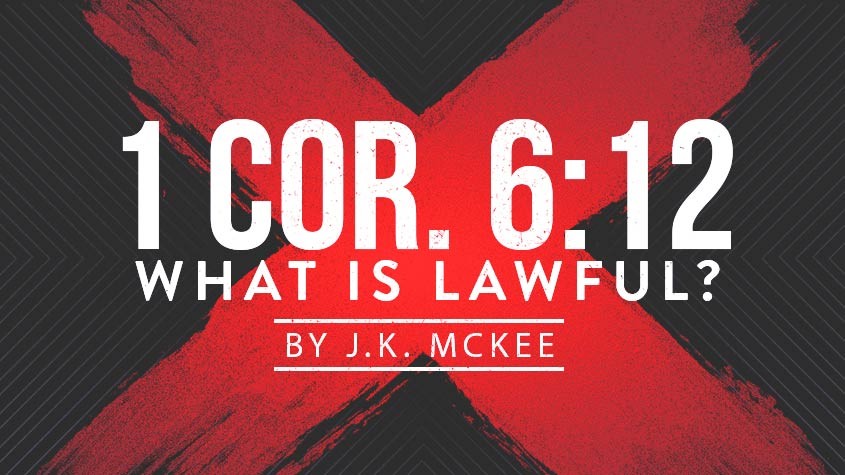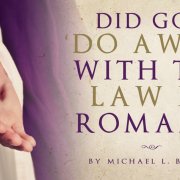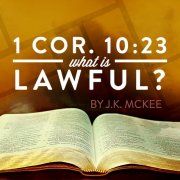1 Corinthians 6:12 – What Things Are Lawful?
This entry has been duplicated in its entirety from tnnonline.net and reproduced from the paperback edition of The New Testament Validates Torah available for purchase here.
How can you say that the Law of Moses is still to be followed by Christians today, when it is quite clear that all things are now lawful?
Pastor: 1 Corinthians 6:12: All things are now lawful.
“All things are lawful for me, but not all things are profitable. All things are lawful for me, but I will not be mastered by anything.”
The pastor’s statement “All things are now lawful,” on the basis of 1 Corinthians 6:12, can be a very slippery slope if it is viewed from the perspective that there are no boundaries whatsoever for the conduct and behavior of Messiah followers. If “All things are now lawful” means that born again Believers are not to keep any laws or commandments from God, then could this not be taken as meaning that we are allowed to do whatever we want, regardless of Divine consequences? Would this, at least, not mean that those things which are considered sin in the Torah or Law of Moses—which (poor) Ancient Israel was prohibited from doing, sometimes with violation meriting capital punishment—are now permitted? This could mean, among other things, that:
- thievery and burglary are neither crimes nor sin
- lying in a court of justice is neither a crime nor a sin
- pre-marital sex, extra-marital affairs, and homosexuality are not sin
- murder is neither a crime nor a sin
- idolatry is not sin, even when practiced alongside the worship of the God of Israel
If the Apostle Paul is actually communicating in 1 Corinthians 6:12 that God’s Law is to be cast aside, then we really should have a problem with Paul. The statement “All things are lawful for me” would flat contradict what the Apostle John’s communicates at the end of Revelation: “But for the cowardly and unbelieving and abominable and murderers and immoral persons and sorcerers and idolaters and all liars, their part will be in the lake that burns with fire and brimstone, which is the second death” (Revelation 21:8). Fortunately, though, I think enough mature Christians are aware of the potential problems with only reading 1 Corinthians 6:12, perhaps significantly removed from the verses which immediately surround it. Paul’s words in 1 Corinthians 6:9-10 preceding, quite surprisingly to some, closely mirror what John says about those who will suffer eternal punishment:
“Or do you not know that the unrighteous will not inherit the kingdom of God? Do not be deceived; neither fornicators, nor idolaters, nor adulterers, nor effeminate, nor homosexuals, nor thieves, nor the covetous, nor drunkards, nor revilers, nor swindlers, will inherit the kingdom of God.”
There has to be a better explanation of 1 Corinthians 6:12, than it somehow allowing for blatant violation of God’s Torah, with people totally dismissing the Law.
Any Bible reader who has surveyed the Pauline Epistles is aware that the Apostle writes more to the Corinthians than to any another audience, and much of what he has to say is delivered in a rather sharp, corrective tone. There is internal evidence from 1 Corinthians 5:9, where Paul says, “I wrote you in my letter not to associate with immoral people,” that he wrote a previous letter to them before what we now call 1 Corinthians, which is no longer extant. The assembly at Corinth was riddled with problems, as many of the Corinthian Believers were not being properly trained up in the foundational guidelines of God’s Word and what He considered acceptable and unacceptable—or they simply disregarded such principles as not being necessary.a
One of the most serious problems that the Corinthian assembly faced was that of sexual immorality. This apparently did not only include sexual promiscuity between males and females, but extended to homosexuality and even incest. In 1 Corinthians 5:1 Paul attests to the fact that “It is actually reported that there is immorality among you, and immorality of such a kind as does not exist even among the Gentiles, that someone has his father’s wife.” He says quite candidly “there is immorality among you, and of a kind that is not found even among pagans” (RSV). This is how bad things were in Corinth, and with this backdrop, how on Earth would Paul be telling them that “all things were lawful,” to be construed as meaning that a Torah-less kind of behavior was acceptable?
It should be first noted that the rendering “All things are lawful” in the NASU (and similarly the RSV, NRSV, ESV) is a translation mistake. A Greek term that would correctly be rendered as “lawful” or “lawfully” in the Apostolic Scriptures is nomimōs (nomi,mwj), “in accordance with rule(s)/law” (BDAG),b which appears in 1 Timothy 1:8: “we know that the Law is good, if one uses it lawfully [nomimōs]” (NASU). But nomimōs (or some other derivation from the root nomos, no,moj) is not what appears in the source text 1 Corinthians 6:12.
The actual clause in question, which appears twice in 1 Corinthians 6:12, is panta moi exestin (pa,nta moi e;xestin). The term of interest is exesti (e;xesti), defined as either “it is allowed, it is in one’s power, is possible” (LS),c or perhaps also “it is proper, permitted” (CGEDNT).d J. Paul Sampley notably explains how “The…translation of e;xestin (exestin) as ‘lawful’ is misleading; the maxim’s contention has nothing to do with the law, but with what is permissible, allowable, or authorized for the believer.”e The NIV rendering of 1 Corinthians 6:12, “Everything is permissible for me,”f does much better justice to what exestin actually means; the NEB has the similar “I am free do to anything”g (cf. 2 Corinthians 12:4). Anthony C. Thiselton reflects the viewpoint, “The traditional translation all things are lawful (AV/KJV, NRSV) does not mean all things are sanctioned by the law, but denotes that which the law no longer prohibits, i.e., it is part of the Corinthian theology that Christian believers have been granted liberty from the law,” as he argues for the rendering “Liberty to do anything.”h While the Torah is a factor in properly interpreting 1 Corinthians 6:12, we will see that more is in view as these Corinthians who were addressed basically threw off all restraints in following any code of conduct.i
The major question that often goes unrealized by many Bible readers when encountering 1 Corinthians 6:12, is whether the Apostle Paul could himself—who has just affirmed in 1 Corinthians 6:9-10 that there are high sins which will merit exclusion from God’s Kingdom, denounced as sin in the Torah—personally conclude “Everything is permissible for me.” Regardless of which position they take regarding the validity of the Torah in the post-resurrection era, 1 Corinthians commentators widely agree that “Everything is permissible” (panta moi exestin) was a slogan adhered to by many of the Corinthians, which Paul thought it quite necessary to address in his letter.j Unlike the NASU, versions like the RSV, NIV, NRSV, ESV, and HCSB include what is stated in quotation marks “ ”, to reflect the view that Paul is repeating what many of the Corinthians have either been saying to him, possibly in a letter to Paul, or what has been reported back to him as what they had been saying (the NLT actually has “You say, ‘I am allowed to do anything’”).k And, this is not the only Corinthian slogan that interpreters have detected within the Epistle of 1 Corinthians that Paul had to address in his letter, which possibly involved:
- “Everything is permissible for me” (1 Corinthians 6:12, NIV; 10:13).
- “[I]t is good for a man not to touch a woman” (1 Corinthians 7:1).
- “[W]e know that we all have knowledge” (1 Corinthians 8:1).
- “[W]e know that there is no such thing as an idol in the world” (1 Corinthians 8:4).
- “But food will not commend us to God” (1 Corinthians 8:8).
- “[T]here is no resurrection of the dead” (1 Corinthians 15:15).l
It is true that there were no punctuation, quotation marks, or even commas in the original Greek letter written to the Corinthians. But in light of how Paul precedes in his comments, chastising the Corinthians for their sin and how he says that such individuals have no place in the Kingdom of God (1 Corinthians 6:9-10), viewing “Everything is permissible” (1 Corinthians 6:12) as an errant Corinthian slogan, separated out with quotation marks “ ”, is most appropriate. Bruce asserts, “these words…are rightly placed within quotation marks; they appear to have been a slogan of the gnosticizing party in the church which was impatient of the restraints of conventional morality.”m While there are those who would say that the Apostle Paul could have been in agreement with this slogan, others would note that his intention is to at least issue some kind of response, if not a rejoinder or rebuttal. Fee thinks that it is hard, at least here in 1 Corinthians 6:12, to think that Paul really likes what he has heard the Corinthians say:
“[H]e does not begin by attacking their illicit behavior; rather, he confronts the theology on which that behavior is predicated. ‘Everything is permissible for me’ is almost certainly a Corinthian theological slogan. This is confirmed by the way Paul cites it again in 10:23; in both cases he qualifies it so sharply as to negate it—at least as a theological absolute.”n
It is important to recognize from the surrounding cotext that nowhere does the Apostle Paul truly agree with the idea panta moi exestin. Paul may have previously told the Corinthians that many things were permissible for Believers, but this slogan was clearly a deliberate misinterpretation of it. He informs his Corinthian audience that “you were washed, but you were sanctified, but you were justified in the name of the Lord Yeshua the Messiah and in the Spirit of our God” (1 Corinthians 6:11). These are people who benefit from the resurrection power of God, the power that raised Yeshua from the dead (1 Corinthians 6:14) and is to give them the strength to submit themselves—especially their bodies—to Him (1 Corinthians 6:15-20) and to the ways of proper conduct. This would most especially include a continual resistance of ancient (temple) prostitution (1 Corinthians 6:16-17; cf. Genesis 2:24), which while technically legal in the Roman Empire and in Corinth, was not permitted for Messiah followers.
In 1 Corinthians 6:12 (NIV), Paul repeats what at least one influential group of Corinthian “Believers” has been saying, and then he issues correction to it:
“Everything is permissible for me” —but not everything is beneficial.
“Everything is permissible for me” —but I will not be mastered by anything.
Witherington astutely informs us, “It is possible to argue that Paul begins his refutatio in 6:12,” as “he begins to question and refute their answers in the form of these slogans.”o Paul has to confront these Corinthians’ logic head on, in getting them to be shaken out of their stupor that panta moi exestin or “Everything is permissible for me” (NIV).
Paul’s first response to panta moi exestin in 1 Corinthians 6:12a is: all’ ou panta sumpherei (avllV ouv pa,nta sumfe,rei), “but not all things are profitable” (NASU). The verb sumpherō (sumfe,rw)p has also been rendered with “helpful” (RSV), “beneficial” (NIV), or “expedient” (KJV); the point taken is that the Corinthians may think that all things they can do are permitted, but they will certainly find out that it will not prove to be for their benefit or usefulness. They might think that they have the freedom to do whatever they want, but many of the Corinthians may have had to find out the hard way that such thinking would be to their severe detriment. This would have been especially true in light of various sexual sins and devious actions being a major issue for the Corinthian assembly.
Paul’s second response to panta moi exestin in 1 Corinthians 6:12b is: all’ ouk egō exousiasthēsomai hupo tinos (avllV ouvk evgw. evxousiasqh,somai u`po, tinoj), “but I will not be brought under the power of any” (KJV). Initially, this rebuttal of the Corinthians’ slogan might seem a bit out of place. Some Corinthians say that they have the freedom to do whatever they want, and then Paul says that he “will not be mastered by anything” (NASU). Could Paul have been agreeing with the Corinthians, or is this an observation on what will ultimately happen to some Corinthian “Believers” who throw off all of God’s instructions and commandments—much less what is in proper decorum—and live unfettered? The reality is that people who think they can do whatever they want, ultimately become subjected under the dominance of sin, with their so-called freedom actually leading to bondage. As Fee describes, “There is a kind of self-deception that inflated spirituality promotes, which suggests to oneself that he/she is acting with freedom and authority, but which in fact is an enslavement of the worst kind—to the very freedom one thinks one has.”q With some instruction on marriage and sexuality in immediate view in 1 Corinthians ch. 7, Hays offers the further appropriate observations:
“The danger is particularly great that the person seeking to exercise freedom through promiscuous sexual activity will end up as a slave to passion. The verb translated ‘dominated’ here [exousiazō, evxousia,zw] is the same one that appears in 7:4, where husband and wife are said to ‘have authority’ over one another’s bodies: by using this term Paul may be suggesting subtly that the ‘wise’ Corinthians who go to prostitutes are in effect surrendering control over themselves to the prostitutes.”r
Further in 1 Corinthians 8:9, Paul speaks rebukingly of “this liberty of yours,” demonstrating how the Corinthian attitude can cause serious problems for the ekklēsia.
Only those who have chosen not to read 1 Corinthians 6:12 carefully, with the wider issues in view, could conclude that Paul actually thinks the Torah or Law of Moses to be irrelevant to Believers’ lives. In 1 Corinthians 5:13 Paul surely quotes from the Torah when it comes to ex-communicating sinners from the assembly: “But those who are outside, God judges. REMOVE THE WICKED MAN FROM AMONG YOURSELVES” (cf. Deuteronomy 17:7; 19:19; 22:21, 24; 24:7). For some reason or another, those in Corinth who advocated panta moi exestin had to be reasoned with on the basis of logic alone, and with whether what they did truly helped them in life.
It is important to keep in mind that 1 Corinthians was one of the first letters written after the Jerusalem Council of Acts 15, where the Apostolic decree directed the new, non-Jewish Believers coming to faith that they must follow four prohibitions in order to assemble with the Jewish Believers (Acts 15:19-21), which included observance of the Torah’s sexual code. In his instruction to the Corinthians, Paul does reflect on the tenor of the Apostolic agreement. But why does Paul not specifically mention Jerusalem’s authority, as at least a co-authority of himself, to get the Corinthians to change in 1 Corinthians? It has been validly proposed among some that in his personal teaching to the Corinthians, Paul’s previous implementation of the Apostolic decree had failed, manifested by the Corinthians’ low moral state. Richard N. Longenecker describes how it could “well be argued that Paul’s problems with the ultraspiritual segment of the church arose, at least in part, because he had originally delivered the Jerusalem letter to them and thus in correcting them was forced to argue on different grounds.”s
Paul’s written instruction in 1 Corinthians does, in fact, affirm the substance of the Apostolic decree, but from another angle. The Apostolic decree may not have worked, and so the Corinthians have to be brought back from an abyss of severe spiritual confusion using other means. In 1 Corinthians 6:12, Paul has to directly refute the slogan panta moi exestin, by getting those who have adopted such an errant viewpoint, to think whether they will truly be better because of it. People who are supposed to be joined to the Messiah need to be candidly asked if— as they compose the Temple of God—it is appropriate to join themselves to a prostitute:
“Do you not know that your bodies are members of Messiah? Shall I then take away the members of Messiah and make them members of a prostitute? May it never be! Or do you not know that the one who joins himself to a prostitute is one body with her? For He says, ‘THE TWO SHALL BECOME ONE FLESH’ [Genesis 2:24]. But the one who joins himself to the Lord is one spirit with Him. Flee immorality. Every other sin that a man commits is outside the body, but the immoral man sins against his own body. Or do you not know that your body is a temple of the Holy Spirit who is in you, whom you have from God, and that you are not your own?” (1 Corinthians 6:15-19).
Thankfully, we get the impression from later Pauline correspondence that he was able to get many of the Corinthians to turn from their sinful ways (2 Corinthians 7:7-10).
Unfortunately, when we look at the slogan “Everything is permissible for me” (1 Corinthians 6:12, NIV) that the Apostle Paul refutes, we see that we have much of the same situation today in modern Christianity. There are people who actually think that once they “get saved” and have been forgiven of their sins, and since they have the covering of grace, they do not have to live in real accordance with any commandments or instructions or protocol—and perhaps are not even subject to some kind of Divine correction. We can legitimately wonder if such individuals are indeed spiritually regenerated, but ultimately God only knows if they are truly born again or not.
What we do know is that as Believers we each have the responsibility to obey the Lord and not fall prey to the kinds of gross immoralities in which many of the Corinthians participated. The Lord’s standard of holiness, godliness, and permissible living is certainly defined for us within the commandments of the Torah. The Torah clearly defines what sin is and what He considers acceptable and unacceptable. By obeying the Torah, we find ourselves able to experience the blessings of God—rather than the penalties, curses, and pain that follow from disobedience to Him.
Endnotes:
a Consult the author’s entries on the Epistles of 1&2 Corinthians in A Survey of the Apostolic Scriptures for the Practical Messianic.
b BDAG, 676.
c LS, 273.
d CGEDNT, 64.
e J. Paul Sampley, “The First Letter to the Corinthians” in NIB, 10:860. Sampley is working from the NRSV in his commentary.
f The TNIV has, “I have the right to do anything.”
g The 1993 German Elberfelder Bibel has “Alles ist mir erlaubt.” The adjective erlaubt means “permitted, allowed,” notably in the sense of something like “Rauchen ist hier nicht [erlaubt]” or “smoking is not allowed here” (Langenscheidts New College German Dictionary, 195).
h Anthony C. Thiselton, New International Greek Testament Commentary: The First Epistle to the Corinthians (Grand Rapids: Eerdmans, 2000), 461.
i With the Greek term exesti (e;xesti) in view, other places where “permitted” or “permissible” (or even “allowed”) would be a much better rendering, include: Mark 2:24, 26; 3:4; 6:18; 10:2; 12:14; Matthew 12:2, 4, 10, 12; 14:4; 19:3; 20:15; 22:17; 27:6; Luke 6:2, 4, 9; 14:3; 20:22; Acts 16:21; 22:25.
j F.F. Bruce, New Century Bible: 1 and 2 Corinthians (London: Oliphants, 1971), 62; Morris, 1 Corinthians, 95; Fee, 1 Corinthians, pp 251-253; Ben Witherington III, Conflict & Community in Corinth: A Socio-Rhetorical Commentary on 1 and 2 Corinthians (Grand Rapids: Eerdmans, 1995), pp 167-168; Richard B. Hays, Interpretation, A Bible Commentary for Teaching and Preaching: 1 Corinthians (Louisville: John Knox Press, 1997), pp 101-103; Thiselton, pp 460-462; Sampley, in NIB, 10:860-862.
k The CJB follows this with, “You say, ‘For me, everything is permitted’?”
l Cf. Witherington, 1&2 Corinthians, 167; also see chart in Hays, 1 Corinthians, 102.
m Bruce, 1 and 2 Corinthians, 62. Hays, 1 Corinthians, pp 102-103 notes how “The translator must decide where Paul is quoting a slogan and where he is offering his own rejoinder,” something which admittedly involves a degree of “guesswork” with value judgments to be made.
n Fee, 1 Corinthians, 252.
o Witherington, 1&2 Corinthians, 167.
p “to be advantageous, help, confer a benefit, be profitable/useful” (BDAG, 960).
q Fee, 1 Corinthians, 253.
r Hays, 1 Corinthians, pp 103-104.
s Richard N. Longenecker, “Acts,” in Frank E. Gaebelein, ed. et. al., Expositor’s Bible Commentary (Grand Rapids: Zondervan, 1981), 9:452.











Leave a Reply
Want to join the discussion?Feel free to contribute!